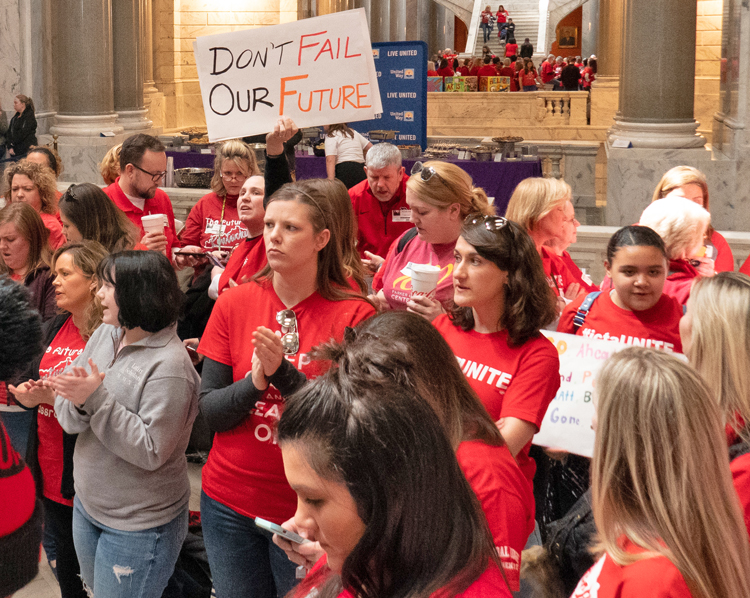FRANKFORT, Ky. — “It just feels like we can’t trust the system right now,” Sheri Tabor, a teacher in Oldham County, told the Louisville Courier-Journal March 7 as she rallied at the state Capitol here. She and hundreds of other teachers were protesting bills in the legislature that would weaken teachers’ union control over pensions and help promote financial aid for private schools at the expense of public education.
On seven different days over the last month teachers and their supporters have called in sick to attend spirited protests outside the state legislative chambers. A good number of students came as well.
The teachers’ actions resulted in the closing of schools in at least 10 school districts and have stalled lawmakers’ efforts to pass two bills. House Bill 225 would have reduced the Kentucky Education Association’s role in selecting the board that controls the Kentucky Teachers’ Retirement System. House Bill 205 would have rewarded contributors to private school scholarship funds with tax breaks.
The largest participation came from teachers in Jefferson County, which includes Louisville, that has some 6,700 teachers and 98,000 students.
Some teachers said they mounted the protests over concern that the bills might be snuck back into consideration, tacked on as so-called mule bills before the close of the state legislature March 28.
The teachers have little confidence in these elected representatives. Last year legislators added an attack on teachers’ pensions onto a sewage bill. The teachers mobilized against the moves on their pensions and to cut funding for schools even further. Gov. Matt Bevin called them “thugs” for protesting. They succeeded in beating back the worst of the attacks.
‘We need to expand the protests’
“We need more than Jefferson County out,” Lora Ruttan, 39, a Louisville high school dance teacher told the Militant at the Capitol rotunda. “We don’t want to lose union control of our pensions.” Her friend, a 10-year teacher who didn’t want her name used for fear of administration reprisal, agreed, saying, “We need the whole state out. That’s what worked in West Virginia.”
The most powerful and effective school workers strike last spring took place in West Virginia, marked by the militant traditions of coal miners’ battles there.
Teachers told the Militant about having to spend hundreds of dollars every year on school supplies and snacks for students, complaining that schools lack the basics.
“The majority of schools in Kentucky have no nurses,” said Shelley Brown March 12. “We have to set up a part of our school office as a ‘sick area’ for kids.”
School administrators and some state legislators assailed the teachers for calling in sick to attend the rallies. In an attempt to intimidate the teachers, the Kentucky Department of Education demanded the names of all those who called in sick and proof they were ill.
Some of the media tried to find and feature students’ parents who would criticize teachers for causing cancelled classes and forcing them to deal with kids out of school. But “many JCPS parents say they support teachers despite the inconvenience of sickouts,” the Courier-Journal had to concede March 12.


